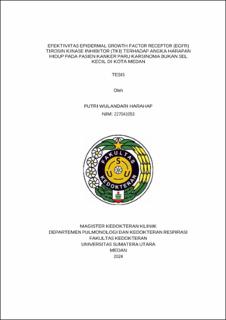Efektivitas Epidermal Growth Factor Receptor (EGFR) Tirosin Kinase Inhibitor (TKI) terhadap Angka Harapan Hidup pada Pasien Kanker Paru Karsinoma Bukan Sel Kecil di Kota Medan
Effectiveness of Epidermal Growth Factor Receptor (EGFR) Tyrosine Kinase Inhibitor (TKI) on Life Expectancy in Non-Small Cell Lung Cancer Patients in Medan City

Date
2024Author
Harahap, Putri Wulandari
Advisor(s)
Tarigan, Setia Putra
Soeroso, Noni Novisari
Metadata
Show full item recordAbstract
Background: Epidermal growth factor receptor (EGFR) mutations most commonly occur in non-small cell lung cancer. Tyrosine kinase inhibitors (TKIs) have significant anti tumor activity in various cancers with EGFR overexpression, but several studies have reported TKI treatment resistance in lung cancer that is dependent on drug generation.
Objective: to determine the effectiveness of EGFR TKI on life expectancy in non-small cell carcinoma lung cancer (NSCCLC) patients in the city of Medan.
Method: This study used a retrospective cross-sectional design. The research was conducted on patients diagnosed with NSCCLC with a positive EGFR mutation and treated with TKI using medical record data at Haji Adam Malik Hospital Medan, Elisabeth Hospital, USU Hospital, and Pirngadi Hospital for the period January 2017-December 2022. Data were analyzed using the Mann-Whitney test.
Results: This study obtained 67 patients who were diagnosed with KPKBSK with positive EGFR mutations. 2nd generation TKI resulted in greater Progression Free Survival, Median Survival Time, Overall Survival compared to patients who received 1st generation TKI with a p value <0.05. 2nd generation TKI resulted in greater Progression Free Survival, Median Survival Time and Overall Survival compared to patients who received 1st generation TKI with a p value <0.05. Conclusion: EGFR TKI generation 2 has better effectiveness than TKI generation 1 in NSCCLC.
